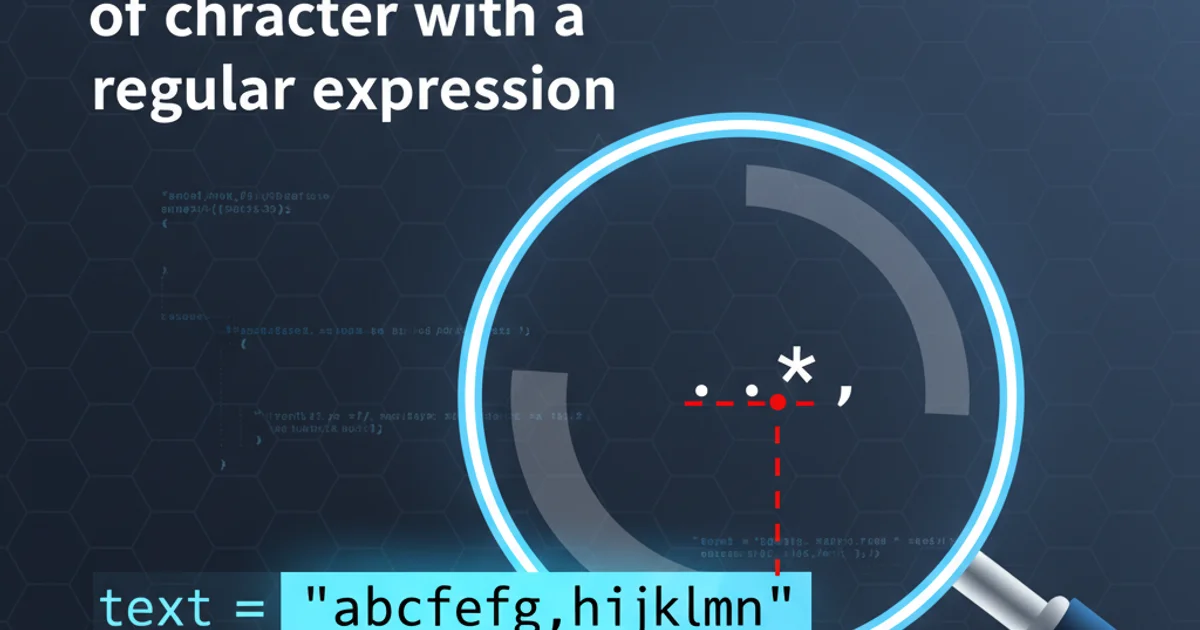Matching up to the first occurrence of a character with a regular expression
Categories:
Mastering Regular Expressions: Matching Up to the First Occurrence of a Character

Learn how to craft regular expressions that precisely match text segments up to the first instance of a specific character, avoiding greedy matching pitfalls.
Regular expressions are powerful tools for pattern matching in text, but they can sometimes behave unexpectedly, especially when dealing with repeated characters. A common challenge is matching a string up to the first occurrence of a particular character, rather than the last. This article will guide you through the concept of 'greediness' in regular expressions and demonstrate how to use non-greedy quantifiers to achieve precise matching.
Understanding Greedy vs. Non-Greedy Matching
By default, most regular expression quantifiers (like *, +, ?, and {n,m}) are 'greedy'. This means they will try to match as much text as possible while still allowing the overall pattern to succeed. When you want to match up to the first instance of a character, this greedy behavior can lead to over-matching. For example, if you want to extract content between the first two commas in a string like one,two,three,four, a greedy match might consume more than intended.
flowchart TD
A[Input String: 'one,two,three,four']
B{Regex: `.*,` (Greedy)}
C[Matches: 'one,two,three,']
D{Regex: `.*?,` (Non-Greedy)}
E[Matches: 'one,']
A --> B
B --> C
A --> D
D --> EIllustrating the difference between greedy and non-greedy matching with a simple regex.
The Solution: Non-Greedy Quantifiers
To make a quantifier non-greedy (or 'lazy'), you simply append a question mark ? after it. So, * becomes *?, + becomes +?, and {n,m} becomes {n,m}?. This tells the regex engine to match as little text as possible while still satisfying the pattern. This is crucial for matching up to the first occurrence of a delimiter.
.*?,
A non-greedy quantifier *? matching any character zero or more times, followed by a comma.
Let's break down .*?,:
.matches any character (except newline).*is a quantifier meaning 'zero or more times'.?immediately after*makes it non-greedy, so it matches the fewest characters possible.,matches the literal comma character.
. character typically does not match newline characters. If your string spans multiple lines and you need to match across them, you might need to enable the 'dotall' or 'single-line' flag (often s in many regex engines), or use [\s\S] instead of . to match any character including newlines.Practical Examples in Different Languages
The principle of non-greedy matching applies across various programming languages, though the implementation details for using regular expressions might differ slightly. Here are examples demonstrating how to extract text up to the first comma.
Python
import re
text = "apple,banana,cherry,date" pattern = r"(.*?),"
match = re.search(pattern, text) if match: print(f"Matched: {match.group(1)}") # Output: Matched: apple
JavaScript
const text = "apple,banana,cherry,date"; const pattern = /(.*?),/;
const match = text.match(pattern);
if (match) {
console.log(Matched: ${match[1]}); // Output: Matched: apple
}
PHP
Java
import java.util.regex.Matcher; import java.util.regex.Pattern;
public class RegexExample { public static void main(String[] args) { String text = "apple,banana,cherry,date"; String patternString = "(.*?),";
Pattern pattern = Pattern.compile(patternString);
Matcher matcher = pattern.matcher(text);
if (matcher.find()) {
System.out.println("Matched: " + matcher.group(1)); // Output: Matched: apple
}
}
}
() in the examples create a capturing group, allowing you to extract the matched content (excluding the delimiter itself) using match.group(1) in Python, match[1] in JavaScript, etc.Matching Up to the First Occurrence of Any Character from a Set
What if you need to match up to the first occurrence of any character from a specific set, not just a single character? You can achieve this by using a character class [] with the non-greedy quantifier.
.*?[,;:]
Matching any character non-greedily until a comma, semicolon, or colon is encountered.
In this regex, [,;:] is a character class that matches a single comma, semicolon, or colon. The .*? ensures that the match stops at the first one it encounters.
1. Identify Your Delimiter
Determine the specific character or set of characters that marks the end of the segment you want to match. This could be a comma, a specific tag, a newline, etc.
2. Use the Any-Character Matcher
Start your pattern with . (or [\s\S] for multi-line content) to match any character.
3. Apply the Non-Greedy Quantifier
Append *? (zero or more) or +? (one or more) to the any-character matcher to ensure it matches the shortest possible string.
4. Specify the Delimiter
Follow the non-greedy quantifier with the literal delimiter character or a character class [] containing your set of delimiters.
5. Capture the Content (Optional)
If you want to extract the matched content without the delimiter, wrap the .*? (or .+?) part in parentheses () to create a capturing group.